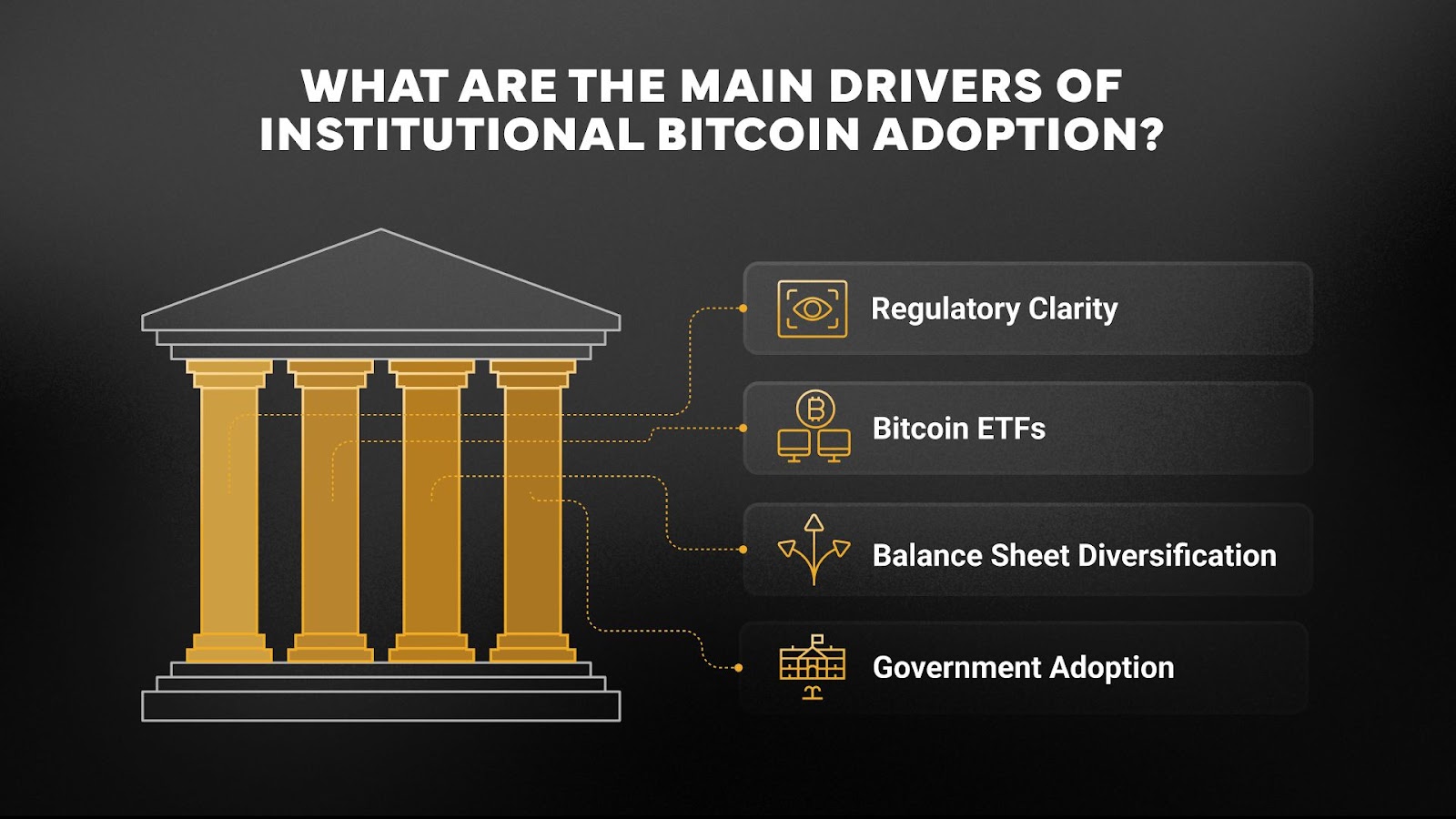Bitcoin
Bitcoin CPI
Venture Portfolio
Funds
Market Insights
Indicators
About
Contact

May 25, 2025





Institutional momentum around Bitcoin (BTC) investing is clearly accelerating. Large investors are no longer treating it as a fringe asset, but rather as a part of long-term financial strategies.
With developments like exchange-traded funds (ETFs), new regulations, and increasing interest from traditional finance giants, Bitcoin is becoming fully integrated into global markets.
Read on to learn about what’s driving institutional Bitcoin adoption.
A growing number of both public and private companies are investing in Bitcoin. Bitcoin is increasingly seen as a reserve asset or portfolio diversification asset due to its price performance and properties, such as decentralization and low correlation with many traditional asset classes.
This trend accelerated after the launch of spot Bitcoin ETFs in the U.S. in 2024, which offer all types of investors a familiar and regulated way to gain exposure to the asset class.
Moreover, traditional finance giants, including banks, are starting to offer more Bitcoin-related services to their clients, such as custody and trading, while Bitcoin lending is also starting to gain traction.

From clearer regulation to global economic shifts and better understanding of the technology, the landscape has become more favorable for institutional Bitcoin adoption. Below are the key trends shaping why and how institutions are entering the Bitcoin market.
Clear and transparent regulation is one of the key steps toward broader institutional acceptance of Bitcoin. Large investors aren't likely to enter the market without well-defined rules that cover storage, trading, reporting, and taxation.
An example is the European Markets in Crypto-Assets (MiCA) framework, which sets unified rules for the cryptoasset industry in the EU. More countries are now drafting similar legislation, helping create a more predictable environment for institutional players.
Spot BTC exchange-traded funds make it possible to invest in Bitcoin through traditional, regulated financial products, avoiding the complexities of custody and security, while still gaining exposure to its price moves.
Bitcoin was once seen as too risky for most institutional players, but the launch of ETFs has significantly lowered that barrier.
ETFs have also improved market liquidity and strengthened Bitcoin’s status as a recognized financial asset. That’s helped build confidence among major institutions, including banks, pension funds, and public companies, who are now using ETFs to invest in Bitcoin.
Bitcoin is gaining popularity among institutional investors as a way to diversify portfolios beyond traditional assets like equities, fiat currencies, or precious metals. In an environment shaped by inflation and geopolitical uncertainty, Bitcoin offers an alternative as a treasury asset.
Many public companies across the world are now starting to build their BTC reserves, following the success of the US-listed company Strategy (formerly MicroStrategy), which holds over 531,000 BTC, or 2.5% of the total BTC supply at the time of writing.
That doesn’t come as a surprise to those who understand that Bitcoin’s disinflationary status makes goods and services cheaper over time if you measure their value in BTC terms.
Some countries are also beginning to adopt Bitcoin at the state level, which helps strengthen institutional trust and influences other countries to consider creating their own BTC reserves.
For example, while El Salvador had to adjust its Bitcoin as legal tender policies due to their deal with the International Monetary Fund in 2024, the country keeps building its BTC portfolio, which now consists of 6,150 BTC.
In the U.S., plans for a Strategic Bitcoin Reserve were officially announced in March 2025.
While the government is still working on implementing this strategy, the fact that the world’s largest economy has decided to establish its BTC reserve adds another layer of credibility for institutional investors. Moreover, this prompted more debates in governments and parliaments of other countries regarding state investments in Bitcoin. Also, the Czech National Bank is now officially looking into the possibility of investing in BTC.
Rising institutional interest in Bitcoin is also closely tied to shifts in the global economy, marked by geopolitical uncertainties, trade wars, inflation risks, and ever-growing debts.
Therefore, Bitcoin is increasingly seen as a neutral, state-free, and central bank-free monetary technology that might help hedge against global uncertainties and currency debasement.
This makes Bitcoin even more appealing to institutions seeking alternatives to traditional financial instruments and ways to preserve capital outside the traditional banking system.
While regulatory clarity is increasing, a recent EY survey showed that institutional investors are still mostly worried about regulatory uncertainties when it comes to investing in digital assets.
However, Bitcoin is considered to be the safest cryptoasset to invest in from a regulatory standpoint.
The same survey highlighted that the two other biggest challenges for institutional investing in Bitcoin are its price volatility and custody. However, just as with regulation, these challenges have considerably lessened in the past few years. BTC's volatility has trended downward, while traditional finance giants such as BNY Mellon now offer Bitcoin custody services.
Also, as institutional investors understand Bitcoin and its value better, other traditionally cited challenges, such as the risk of market manipulation, the lack of fundamentals of valuation, or its use in illicit activities, are being debunked and becoming less of a concern.
The rise of BTC ETFs and overall Bitcoin adoption, as well as growing government and institutional interest, all point to a maturing Bitcoin market.
If these trends remain, more financial institutions are likely to explore Bitcoin, not only for trading, but also as a long-term reserve asset and part of client-facing services.
Moreover, as Bitcoin developers are working on expanding its ecosystem and use cases, this might strengthen demand for BTC even further, subsequently increasing institutional interest.
However, both retail and institutional investors will keep observing how BTC behaves in these uncertain times and whether developers are successful in making Bitcoin more resilient, scalable, and attractive to the masses.
In either case, while its role in global finance is still forming, Bitcoin is steadily gaining ground as a legitimate alternative asset.
The most recent developments in institutional adoption of Bitcoin include more public companies creating their BTC reserves, while conservative traditional finance players, such as pension funds, are starting to invest in Bitcoin. Also, more Bitcoin-related products and services are being offered by institutions, while the U.S. announced plans for a Strategic Bitcoin Reserve. This signals rising government-level interest and growing institutional trust in BTC.
Institutions are buying Bitcoin now because regulation is improving, and adoption and understanding of this monetary technology are growing. Moreover, Bitcoin has proved to be able to outperform traditional asset classes such as stocks and gold over longer time frames. BTC is also seen as a hedge against global uncertainties and currency debasement. Growing government interest adds further legitimacy to its role as a reserve asset as well.
Bitcoin ETFs are influencing institutional adoption by offering a regulated and familiar way to gain BTC exposure. They remove the need to manage wallets or private keys, reducing technical barriers. This makes BTC exposure more accessible and credible for large investors.
At the time of writing, the largest institutional holder of Bitcoin is BlackRock’s iShares Bitcoin Trust (IBIT) ETF, with more than 572,000 BTC stored on behalf of its investors. Meanwhile, the U.S.-based public company Strategy is the second-largest institutional holder of Bitcoin, with more than 531,000 BTC in its portfolio. That’s more than 2.5% of the total 21 million supply. The company continues to actively increase its position through regular purchases.
The key factors driving institutional interest in Bitcoin include regulatory clarity, macroeconomic instability, and growing recognition of BTC as a store of value. Inflation, currency risk, and geopolitical tensions push investors to seek alternatives. Bitcoin’s independence from central banks and governments, alongside its historical price performance, has made it attractive as a strategic asset.